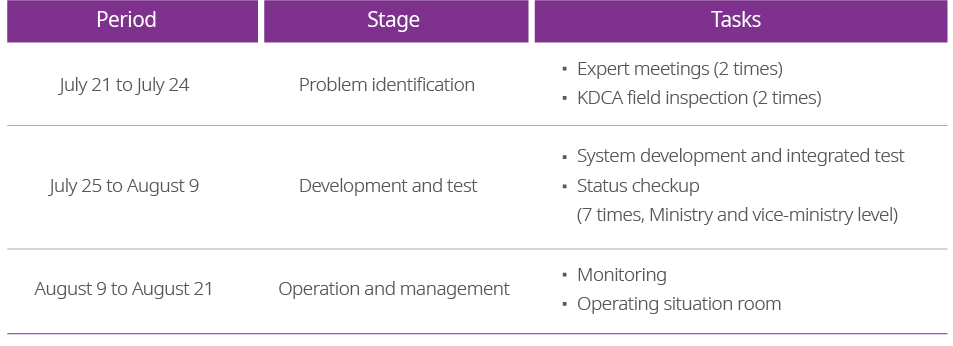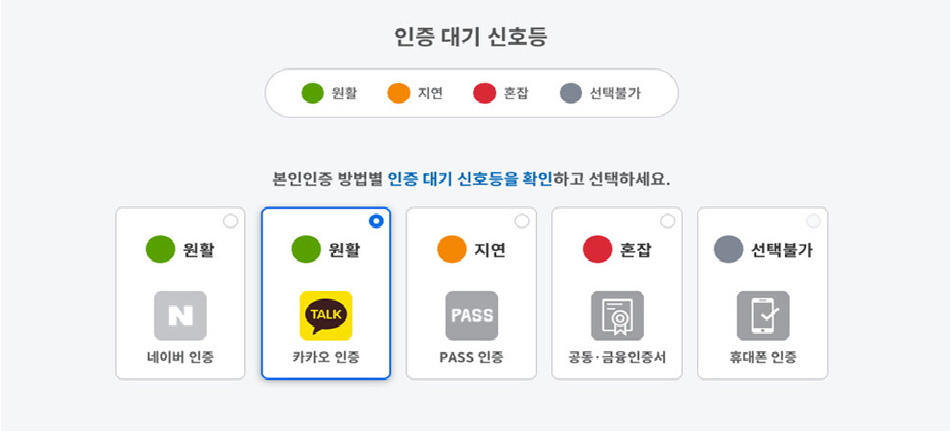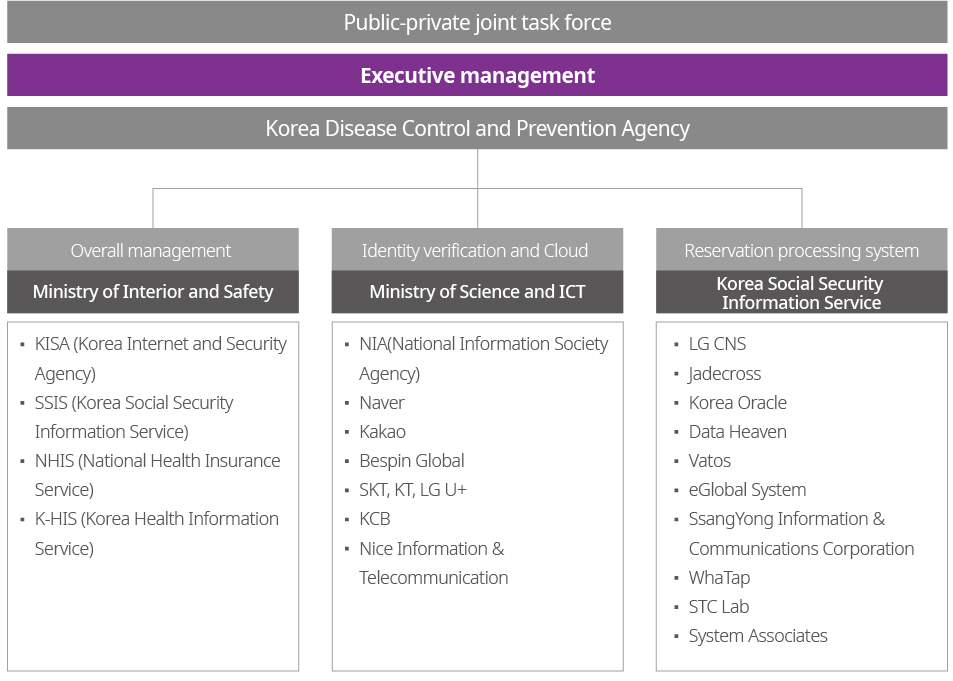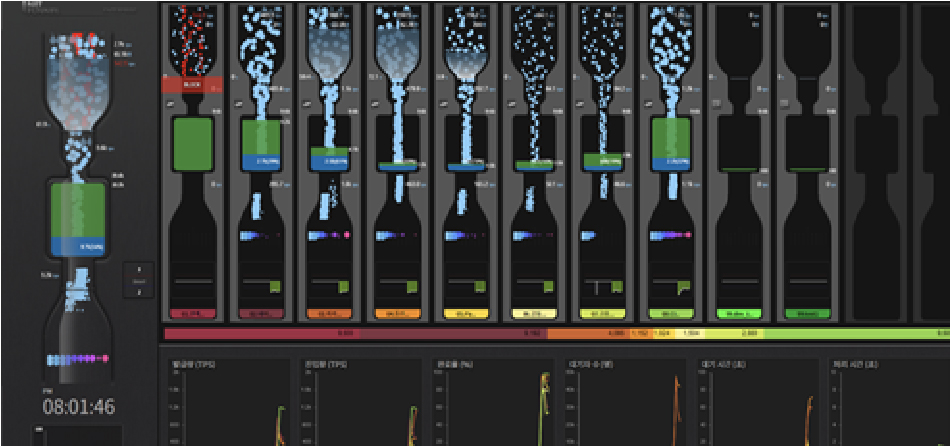Content
OCTOBER2021
Dr. Taewoo Nam, Professor, Graduate School of Governance,
Sungkyunkwan University
This brief report describes how the Korean government successfully boosted the rate of coronavirus vaccination reservation in July and August, 2021. Considering the depressed economy situation made by mandatory social distancing, Korea was under pressure of finishing the second shot of vaccination as soon as possible. However, it was a hard work to arrange the vaccination appointments for all adults in a very short period even though the Korean e-government has advanced infrastructures. A key to upgrading vaccination reservation was public-private collaboration on open government, data management, and cloud computing.
This report introduces the details of the collaboration.
▶ Crisis in Vaccination Reservation
Korea Disease Control and Prevention Agency (KDCA) established the coronavirus vaccination booking system (ncvr.kdca.go.kr), along with reservation via 1-3-3-9 call center and visit to a community center. The senior generation was divided into four groups in their age: 60 to 64, 65 to 69, 70 to 74, and 75 and older. Since most of vaccine reservations for the elderly were made through 1-3-3-9 call center and visit in person, the online reservation system worked well. From July, 2021, 50s (7.5 million) were allowed to make an online reservation, which is the only way for vaccination booking. The reservation system was congested with log-in by millions of people, notifying 111 hours as waiting time on the webpage. In the first day of reservation for 50s in their age, the quadrupled number of the expectation tried an access to the system. The server capacity (300,000 bookings per hour) turned out insufficient for the whole number of 50s. Especially, identity verification and search for vaccination institutes suffered from overload.
▶Improving the Vaccination Reservation System
Ministry of the Interior and Safety, Ministry of Science and ICT, KDCA, National Information Society Agency (NIA), and 18 private corporations (the Korean No. 1 portal site, telecommunication carriers, and cloud computing service providers) established the public-private joint task force in July 22, 2021. This public-private collaboration effort aimed to inspect, modify, and improve the vaccination reservation system. It took merely two weeks for the task force to enable a simultaneous access of 12 million people in 10 minutes.
Table 1. What the public-private joint task force did

The task force upgraded the vaccination reservation system in three aspects. First, identity verification as the most serious bottle neck point was transferred to private cloud. This transfer decreased loads on the reservation system and speeded up the processing, thereby solving significantly reducing the wait time. Despite congested log-in trials, flexible extensibility of cloud enabled to respond and process a massive number of simultaneous requests. Second, the reservation system diversified identity verification by adding such new simple ways as Naver, Kakao, and PASS that most citizens prefer. Lastly, the system signaled the status (green for good, yellow for delayed, or red for congested) in each mode for identity verification.
Figure 1. What changed with private cloud

Figure 2. How the system signaled the status for identity verification

▶ The Role of Participating Organizations
The contribution of participating organizations is categorized into three roles: identity verification and cloud, reservation processing, and overall management of public agencies.
Figure 3. Participating organizations

The cloud software developer, Bespin Global, involved in building up infrastructure for private cloud transition of identity verification and webpage for a simple access. For stable operation of the simple access webpage, Naver Cloud provided technologies for optimization of cloud server infrastructure and service. Naver, Kakao, KCB, and three Korean telecommunication carriers maximized the capacity of identity verification service that each company has. Jadecross supported a solution (NetFUNNEL) for real-time monitoring and control of traffics to evade overloads between diversified identity verification services and the vaccination reservation site.
Figure 4. Real-time monitoring of each mode for identity verification by NetFUNNEL

LG CNS optimized vaccination institute search as an overload factor so that the responding time decreased from 2.58 to 0.004 seconds (30 times improvement in maximum). Korea Oracle, Data Heaven, Vatos, eGlobal System, and SsangYong Information & Communications Corporation gave supports in diagnosis, expansion, optimization, and encryption of the KDCA reservation system database. System Associates, WhaTap, and STC Lab rearranged the reservation system server structure to a “dedicated” mode that works well in processing large-scale accesses, thereby raising the processing speed from 0.3 million to 1 million cases.
On the other hand, public agencies overall managed improvements in their own area related to online vaccination reservation. NIA led overall improvement in cloud-based verification system. Korea Internet and Security Agency inspected weak points in security and contributed to service stability. Korea Social Security Information Service managed the reservation processing system of KDCA and inspected server and database optimization. Korea Health Information Service and National Health Insurance Service prevented possible errors by operating the professional inspection team.
▶ Success Factors of Reservation System Improvement
Two weeks were sufficient for Korea to correct all technical errors made by overloads on the vaccination reservation system. Usually this kind of system development and improvement requires more than two months, but public agencies and private corporations made joint efforts to solve or at least soothe the most important, imminent, and wicked problem.
A retrospective view may consider various success factors. An agile cross-sectoral organization was pivotal to a fast response to the system-driven error correction. The temporary task force was efficient as well as effective in optimally designating relevant roles to totally 24 institutes. For the future, the Korean government plans to enhance the sustainability of an agile organization based on public-private collaboration.
If this present effort is not enough to explain the success, other success factors could be found in the history of Korean informatization. Korea implemented such a national-scale big project named “Computerization of resident registration” between 1988 and 1992. Since this project, the citizen registration number has helped identify each citizen. The data based on the citizen registration number facilitates identity verification in the Internet age.
More recently, the Act on Promotion of the Provision and Use of Public Data has been enforced since 2013. By this act, any citizen and private organization has access to and use right of the data that public sector organizations own and manage. The public-private collaboration on improving the vaccination reservation system is also based on public data openness. Moreover, the Digital Signature Act was revised in June 2020. The revision supports digital signature of private entities in government services such as HomeTax (digital front desk of Korean Taxation, www.hometax.go.kr) and Government 24 (portal of online certificate issuance services, www.gov.kr). This revised act helped the vaccination reservation system to use identity verification of private entities.
Last but not least, data sovereignty is a new issue that emerges in struggling the coronavirus pandemic. ICT service corporations in Korea have competed with global dinosaurs such as Amazon, Google, and Microsoft. These Korean platform companies have their own knowhow in using their data and drawing insights from the data. Besides, the Korean ICT companies with a high level of global competitive power have played a crucial role as a partner of government to collaboratively solve public problems.
- Magazines






